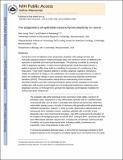The epigenetics of epithelial-mesenchymal plasticity in cancer
Author(s)
Tam, Wai Leong; Weinberg, Robert A
Downloadnihms615921.pdf (446.8Kb)
OPEN_ACCESS_POLICY
Open Access Policy
Creative Commons Attribution-Noncommercial-Share Alike
Terms of use
Metadata
Show full item recordAbstract
During the course of malignant cancer progression, neoplastic cells undergo dynamic and reversible transitions between multiple phenotypic states, the extremes of which are defined by the expression of epithelial and mesenchymal phenotypes. This plasticity is enabled by underlying shifts in epigenetic regulation. A small cohort of pleiotropically acting transcription factors is widely recognized to effect these shifts by controlling the expression of a constituency of key target genes. These master regulators depend on complex epigenetic regulatory mechanisms, notably the induction of changes in the modifications of chromatin-associated histones, in order to achieve the widespread changes in gene expression observed during epithelial-mesenchymal transitions (EMTs). These associations indicate that an understanding of the functional interactions between such EMT-inducing transcription factors and the modulators of chromatin configuration will provide crucial insights into the fundamental mechanisms underlying cancer progression and may, in the longer term, generate new diagnostic and therapeutic modalities for treating high-grade malignancies.
Date issued
2013-11Department
Massachusetts Institute of Technology. Department of Biology; Ludwig Center for Molecular Oncology (Massachusetts Institute of Technology)Journal
Nature Medicine
Publisher
Nature Publishing Group
Citation
Tam, Wai Leong, and Robert A Weinberg. “The Epigenetics of Epithelial-Mesenchymal Plasticity in Cancer.” Nature Medicine 19, 11 (November 2013): 1438–1449 © 2013 Nature America, Inc
Version: Author's final manuscript
ISSN
1078-8956
1546-170X